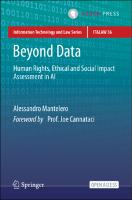Beyond Data
Human Rights, Ethical and Social Impact Assessment in AI
Abstract
This open access book focuses on the impact of Artificial Intelligence (AI) on individuals and society from a legal perspective, providing a comprehensive risk-based methodological framework to address it. Building on the limitations of data protection in dealing with the challenges of AI, the author proposes an integrated approach to risk assessment that focuses on human rights and encompasses contextual social and ethical values. The core of the analysis concerns the assessment methodology and the role of experts in steering the design of AI products and services by business and public bodies in the direction of human rights and societal values. Taking into account the ongoing debate on AI regulation, the proposed assessment model also bridges the gap between risk-based provisions and their real-world implementation. The central focus of the book on human rights and societal values in AI and the proposed solutions will make it of interest to legal scholars, AI developers and providers, policy makers and regulators. Alessandro Mantelero is Associate Professor of Private Law and Law & Technology in the Department of Management and Production Engineering at the Politecnico di Torino in Turin, Italy.


 Download
Download Web Shop
Web Shop